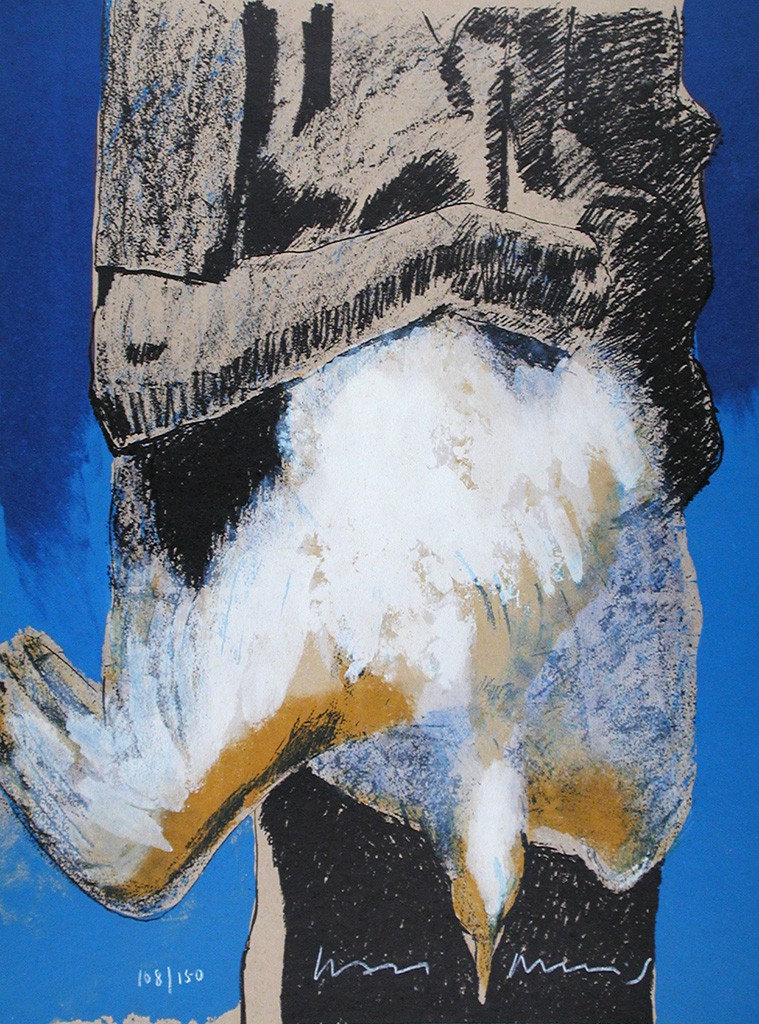Maria da Graça Pinto de Almeida Morais was born in Freixiel, Vila Flor, on March 17, 1948.
She lived in Mozambique between 1957 and 1958, returning to Vieiro the following year. In 1966, she entered the Escola Superior de Belas Artes do Porto to study painting, having completed the course in 1971 and presenting her 5th-year evaluation exhibition, at the Escola Superior de Belas Artes do Porto. In 1974, she exhibited for the first time, at the Alberto Sampaio Museum, in Guimarães.
In 1974, on the 19th of April in Guimarães, the daughter Joana Andrea Pinto Morais Lopes da Silva, now a movie director, was born, the fruit of her first marriage to the painter Jaime Lopes da Silva, known as Jaime Silva.
In 1975 she participated in the International Art Encounters in Viana do Castelo. She founded, with eight artists and an art critic, Grupo Puzzle, with which she collaborated in group exhibitions for two years.
Between 1976 and 1978, she lived in Paris on a scholarship from the Calouste Gulbenkian Foundation, where she met the artists Eduardo Arroyo and Bernard Rancillac and deepened her study of the work of Picasso, Matisse and Cézanne. In May 1978, she held a solo exhibition at the Portuguese Cultural Center in Paris.
In 1983, she began her professional relationship with the gallerist Manuel de Brito and exhibited at Galeria 111, in Lisbon, and at the Museu do Abade de Baçal, in Bragança.
In 1984, she exhibited at the Museum of Modern Art in São Paulo: Mapas e o Espírito da Oliveira, whose works she previously presented in Lisbon, at the National Society of Fine Arts. She exhibits twenty drawings on the Tree. It is part of the exhibition Onze Jovens Pintores Portugueses, at the Instituto Alemão, in Lisbon, curated by Rui Mário Gonçalves. She presents the same exhibition, in 1985, at the Museum of Modern Art in Rio de Janeiro. The same series, added to the Eroticism and Death series, is on display at the University of Granada. The monograph Graça Morais, Linhas da Terra, by António Mega Ferreira (National Press-Casa da Moeda) is published.
Later, in 2000, she exhibited the series 'Terra Quente – Fim do Milénio', at gallery 111, in Lisbon. Joana Morais films the documentary 'In the Head of a Woman is the story of a Village', about the life and work of her mother, Graça Morais. She exhibits, in Paris, the same series at the Cultural Center of the Calouste Gulbenkian Foundation and Deusas da Montanha in the Instituto Camões delegation, in 2001. Orpheu e Eurydice, by Sophia de Mello Breyner Andresen, is edited with works by the artist.
In 2005, she exhibited, at 111 in Porto, the Visitation series. The book Uma Geografia da Alma (Bial) is published. "Portraits and Self-Portraits", Cascais Cultural Centre; "The blue eyes of the sea", Sines Arts Centre.
Her vast artistic career also includes works in the public domain, such as the tile panels at the Municipal Market of Bragança, the Municipal Library of Carrazeda de Ansiães, the Caixa de Crédito Agrícola of Bragança, the Municipal Theater of Bragança and the AstroPhysical Center and Porto Planetarium, tiles in the headquarters building of Caixa Geral de Depósitos (in Lisbon), in the Belarus Metro Station in Moscow, in the Fogueteiro train station (Seixal) and in the Amadora Metro Station – Falagueira and also also the tiled panels on the Rinchoa/Rio de Mouro Viaduct and on the Frades Hydroelectric Power Station (Vieira do Minho).
She is a member of the National Academy of Fine Arts and of various associations, confraternities and cultural foundations.
Centro Português de Serigrafia © 2026
Thank you very much for subscribing the CPS newsletter.
